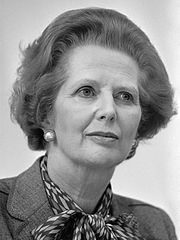
Back نيكولاس رايدلي Arabic نيكولاس رايدلى ARZ Nicholas Ridley (Politiker) German Nicholas Ridley (baron Ridley de Liddesdale) French Nicholas Ridley (politico) Italian Nicholas Ridley Dutch Nicholas Ridley (baron Ridley of Liddesdale) Polish
The Lord Ridley of Liddesdale | |
|---|---|
 1978 portrait, from the National Portrait Gallery collection | |
| Secretary of State for Trade and Industry | |
| In office 24 July 1989 – 14 July 1990 | |
| Prime Minister | Margaret Thatcher |
| Preceded by | The Lord Young of Graffham |
| Succeeded by | Peter Lilley |
| Secretary of State for the Environment | |
| In office 21 May 1986 – 24 July 1989 | |
| Prime Minister | Margaret Thatcher |
| Preceded by | Kenneth Baker |
| Succeeded by | Chris Patten |
| Secretary of State for Transport | |
| In office 16 October 1983 – 21 May 1986 | |
| Prime Minister | Margaret Thatcher |
| Preceded by | Tom King |
| Succeeded by | John Moore |
| Financial Secretary to the Treasury | |
| In office 14 September 1981 – 16 October 1983 | |
| Prime Minister | Margaret Thatcher |
| Preceded by | Nigel Lawson |
| Succeeded by | John Moore |
| Member of the House of Lords | |
| Life peerage 28 July 1992 – 4 March 1993 | |
| Member of Parliament for Cirencester and Tewkesbury | |
| In office 8 October 1959 – 16 March 1992 | |
| Preceded by | William Morrison |
| Succeeded by | Geoffrey Clifton-Brown |
| Personal details | |
| Born | Nicholas Ridley 17 February 1929 Northumberland, England |
| Died | 4 March 1993 (aged 64) Carlisle, Cumbria, England |
| Political party | Conservative |
| Spouse |
Clayre Campbell
(m. 1950; div. 1974) |
| Children | 3 (including Jane) |
| Parent | The 3rd Viscount Ridley (father) |
| Relatives | The 4th Viscount Ridley (brother) Elisabeth Lutyens (aunt) Mary Lutyens (aunt) |
| Alma mater | Balliol College, Oxford |
| Part of the politics series on |
| Thatcherism |
|---|
 |
Nicholas Ridley, Baron Ridley of Liddesdale, PC (17 February 1929 – 4 March 1993), was a British Conservative Party politician and government minister.
As President of the Selsdon Group, a free-market lobby within the Conservative Party, he was closely aligned with Margaret Thatcher, and became one of her Ministers of State at the Foreign and Commonwealth Office in 1979. Responsible for the Falkland Islands, he tried to resolve the long-running sovereignty issue with Argentina, which detected Britain's reluctance to defend the territory, and later invaded it.
As Secretary of State for Transport, Ridley performed a key function in building up coal stocks in advance of the 1984–85 miners' strike, which helped the government to defeat the National Union of Mineworkers (NUM).
As Secretary of State for the Environment, Ridley opposed a low-cost housing development near his own property, earning him the title of "NIMBY" ("Not in My Back Yard"). He was also responsible for introducing the "poll tax" (formally known as the Community Charge), which was one of the main factors leading to Thatcher's resignation in 1990. He was created a life peer in 1992.